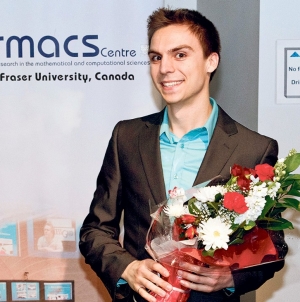Mar 30 2013
A three-minute presentation about how his research solves a problem with repairing satellites in space was a winner for Mike Henrey.
 Mike Henrey
Mike Henrey
The engineering science student beat out 13 final-round competitors to win both the first-place award ($1500) and the People’s Choice award ($500) in SFU’s first 3-Minute Thesis competition, which featured some 50 graduate students.
Henrey’s presentation explained why he built a robot with six legs that use a simulated gecko adhesive to stick to the outside of a satellite.
He also spoke about testing the adhesive in a space-like environment at the European Space Agency in the Netherlands last summer.
Henrey believes he won the competition because “I put a lot of effort into trying to sell the robot. I framed it as a problem with an interesting solution that I thought would capture people’s attention.”
The judges were SFU President Andrew Petter, VP Academic Jon Driver, Associate VP Research Norbert Haunerland, VP Finance Pat Hibbits and board of governors chair Brian Taylor.
Graduate Studies associate dean of students, Mary-Ellen Kelm, organized the event, which drew a capacity crowd in the IRMACS theatre.
“It was amazing,” says Kelm. “The students’ presentations said so much about the practical application of their graduate research to real world problems. They showed that SFU is living up to its motto of engaging the world.”
Henrey was happy to showcase his research to faculty, students and business representatives.
“I got to network with people in industry, which was great because I’m getting ready to graduate and looking for a job,” he says.
His advice for future competitors: “Make sure you explain how your project works, because the audience is genuinely interested in your technology and methods.
“And if you want to stand out you have to be interesting.”
Henrey’s paper about testing simulated gecko adhesives in outer space will appear in an upcoming edition of the Journal of Aerospace Science and Technology.